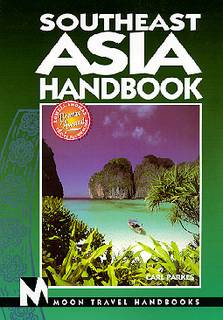
Party with Don George!
Eight Diagrams
May 11, 2005
Interview with Lonely Planet's Don George
Interview by Wayne Yang
I have been a fan of the Lonely Planet (LP) travel guides since I first stumbled onto them when I was traveling in Asia in the late 1980s. Other guidebooks tend to give you cut and dried descriptions of well-known sites and hotels. LP gives you the kind of candid recommendations that you can expect from friends who have traveled to a location. And the books are also often colorfully written. So you can imagine my excitement when Don George, the Global Travel Editor of Lonely Planet Publications, agreed to an interview.
Don was travel editor at the San Francisco Examiner & Chronicle. He was also the founding editor of Salon.com's travel site, Wanderlust. He has edited four travel anthologies. Earlier this year, he published the Lonely Planet Guide to Travel Writing, which gives his tips on how to become a travel writer.
WY: You have one of the best "getting started" in the travel writing business stories. I cannot imagine one that better illustrates how to marry audacity and talent. How well do you think your experience still serves as a model for others who want to get started in travel writing?
DG: I think the general principles that story illustrates are still valid: Identify what you really want to do, then identify and explore - with sensitivity, intelligence, respect and care -- all the avenues that could help you do that; keep refining your craft and your goals at the same time; knock on all the potentially appropriate doors and when they open a crack, keep them open. To all that I would add: Look for mentors and honor them and learn scrupulously from them when you find them.
WY: In addition to the rise of online venues, how has the market for travel writing changed or not changed since you got started?
DG: I think there is more competition - more would-be travel writers -- now than when I was getting started. Unfortunately, there has not been a proportionate increase in the number of outlets for travel writing, and the budgets at the existing outlets have not risen proportionately, either.
WY: You have written that you became interested in traveling because of your need to "understand everything," "our reason for being here." Why did that process involve reading, writing and traveling, and what do you think you have learned about "our reason for being here?"
DG: It was intuitive for me - I reveled in new experiences and the learning they embodied. Once I lived abroad, I quickly realized that for me, the world was the best classroom. Reading was a way to deepen my appreciation of what I was experiencing, and writing was a way to organize it and analyze it, give it a coherent place in the puzzle of my life. As for our reason for being here, I'm still puzzling through that, but I think it has something to do with absorbing as much of the planet as we can, sowing kindness and compassion wherever we go, increasing global understanding and respect, furthering the evolution of the planet toward peace and harmony, and living as fully, mindfully and reverently as we can.
WY: Can you mention what reading was instrumental in your development as a travel writer?
DG: James Joyce, William Butler Yeats, Wallace Stevens, T.S. Eliot, W. S. Merwin, Ernest Hemingway, F. Scott Fitzgerald - well, basically, the usual-suspect 20th-century American and European canon of poets and fiction writers one studied in high school and university in the 1970s. These were my initial inspiration and nurturing to become a writer.
WY: Any which were particularly seminal to you?
DG: The most seminal moment for me was my senior year at Princeton taking a small, selective writing workshop taught by John McPhee called "The Literature of Fact." That taught me that nonfiction could be just as artful and elevated as all the fiction and poetry I'd been studying, analyzing and pedestal-izing all those years. The "travel" writers I have most learned from are Jan Morris, Tim Cahill, Pico Iyer, Annie Dillard, Paul Theroux and Peter Matthiessen.
WY: About traveling to Africa: you have talked about the overwhelming feeling that you were a human in nature's country. How much of that feeling do you still get on traveling into the wilderness?
DG: I still get it, still overwhelmingly.
WY: How is that different from your feeling on urban excursions?
DG: Urban wildness can be overwhelming, too, but without that frisson of being in the presence of some universal power or truth infinitely greater than you are.
WY: You have said that travel writing is an art, not just a letter home. You talk about shaping travel into "tales." What makes good travel writing good?
DG: I spend much of my book talking about this, but in essence: The writer has digested his/her experience, gleaned a fundamental truth or lesson from it and then shaped the story so that it reveals that lesson step by step.
WY: What are your feelings on how much creative non-fiction / literary techniques should be used?
Essentially, a good travel story is like a good work of fiction, with a beginning, a middle and an end, characters and conflict, dialogue, telling details, a narrative arc. The full range of literary techniques should be employed.
WY: You once complimented a writer for how his book was "very Lonely Planet-ish," because its focus was "very traditional, rooted in the ground." Can you give us further insight into what it means to be "very Lonely Planet-ish?"
DG: I think being "very LP-ish" means staying true to an experience, staying rooted in the nitty-gritty riches of a place and a people, understanding the place's/experience's background and context, experiencing openly and as fully as possible, seeing with unflinching eyes, and traveling with respect and awareness.
WY; Submission guidelines seem to always discourage writers from submitting photographs with their queries. Obviously, the average writer is not going to be a very good photographer. Assuming, however, that someone is not deterred, that he thinks he is good at both, how is the submission process different for him as a writer-photographer?
DG: It is hard to be great at both writing and photography because you use your mind in different ways as a writer and as a photographer. But it is certainly possible: When I was at the Examiner & Chronicle, I had to take photos to go with my stories, and some of these won photo awards. But if you want to do both, you have to leave sufficient time for both or master the art of switching from reporter-writer to photographer and back again. I think someone who feels they have great photos to go with their great story should simply submit a dozen outstanding examples of their work when they submit their story. All the editor can do is say, No thanks. Submitting photos will not disqualify the article. And there are some lower-tier publications that very much welcome photo-text packages.
WY: In your own experience, you mention the importance of serendipity in propelling your career, but obviously you put yourself in position to benefit from that kind of good fortune. What steps (besides reading the Lonely Planet guide "Travel Writing," of course!) should an aspiring travel writer take to ensure they see more serendipity in their own development?
DG: I would repeat what I said in my first answer: Identify what you really want to do, then identify and explore - with sensitivity, intelligence, respect and care -- all the avenues that could help you do that; keep refining your craft and your goals at the same time; knock on all the potentially appropriate doors and when they open a crack, keep them open. We make our own serendipity. Part of it is talent, part of it is cultivating possibility, and part of it is being open to opportunity when it suddenly presents itself.
My favorite book of all is The Snow Leopard, by Peter Matthiessen, a masterful combination of intensely personal exploration and intensely vivid description, infused with a searing, soaring humanity, spirituality and intelligence. Also on the list, in no particular order: Paul Theroux, especially The Great Railway Bazaar; Bruce Chatwin, In Patagonia; John McPhee, Coming into the Country; Annie Dillard, Pilgrim at Tinker Creek; Pico Iyer, Video Night in Kathmandu; Tim Cahill, Pass the Butterworms; Jan Morris, Journeys (just about anything by Jan Morris is transcendent, but Journeys is a good place to start).
Eight Diagrams Interview with Don George

